Related Research Articles
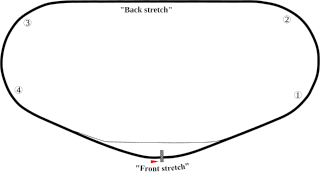
The Daytona 500 is a 500-mile-long (805 km) NASCAR Cup Series motor race held annually at Daytona International Speedway in Daytona Beach, Florida. It is the first of two Cup races held every year at Daytona, the second being the Coke Zero Sugar 400, and one of three held in Florida, with the annual fall showdown Dixie Vodka 400 being held at Homestead south of Miami. From 1988 to 2019, it was one of the four restrictor plate races on the Cup schedule. The inaugural Daytona 500 was held in 1959 coinciding with the opening of the speedway and since 1982, it has been the season-opening race of the Cup series.
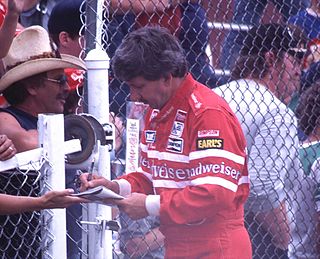
Lawrence Neil Bonnett was an American NASCAR driver who compiled 18 victories and 20 poles over his 18-year career. Bonnett was a member of the Alabama Gang, and started his career with the help of Bobby and Donnie Allison. He rose to prominence in the late 1970s with his performances in cars owned by Jim Stacy and Wood Brothers Racing, becoming one of the top competitors in the 1980s. The Alabama native currently ranks 47th in all-time NASCAR Cup victories. He appeared in the 1983 film Stroker Ace and the 1990 film Days of Thunder. Bonnett hosted the TV show Winners for TNN from 1991 to 1994. He was a color commentator for CBS, TBS, and TNN in the years until his death. Bonnett's driving career was interrupted by a severe brain injury from a crash in 1990. He was killed while practicing for the 1994 Daytona 500 for a much-anticipated comeback.

The 2000 NASCAR Winston Cup Series was the 52nd season of professional stock car racing in the United States, and was the 29th modern-era Cup series. The season began on February 13 and ended on November 20. Joe Gibbs Racing driver Bobby Labonte was crowned champion at season's end. The NASCAR Manufacturers' Championship was won by Ford as they captured 14 wins and 234 points to better Pontiac's 11 wins and 213 points. Chevrolet finished third with nine wins and 199 points.

NASCAR on ESPN is the now-defunct former package and branding of coverage of NASCAR races on ESPN, ESPN2, and ABC. ABC, and later the ESPN family of networks, carried NASCAR events from the sanctioning body's top three divisions at various points from the early 1960s until 2000, after the Truck Series rights were lost. However, ESPN resumed coverage of NASCAR with the Nationwide Series race at Daytona in February 2007 and the then-Nextel Cup Series at Indianapolis in July 2007. ESPN's final race was the Ford EcoBoost 400 at the Homestead–Miami Speedway on November 16, 2014, with Kevin Harvick winning that year's NASCAR Sprint Cup Series championship.
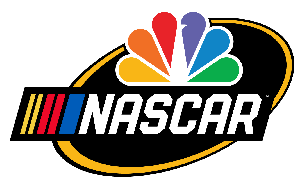
NASCAR on NBC is the branding used for broadcasts of NASCAR races that are produced by NBC Sports, and televised on several NBCUniversal-owned television networks, including the NBC broadcast network in the United States. The network originally aired races, typically during the second half of the season, from 1999 to 2006.
The television and radio rights to broadcast NASCAR are among the most expensive broadcast rights of any American sport, with the current television contract with Fox Sports and NBC Sports being worth around US$8 billion.

NASCAR on TNT is the branding for NASCAR races broadcast on TNT by Turner Sports between 2001 and 2014 and for races from 2025–2031. The network continued Turner's longstanding relationship with NASCAR that dated back to its initial association with TBS Superstation.
Kenley Dean Squier was an American sportscaster and motorsports editor from Waterbury, Vermont. From 1979 to 1997, he served as the lap-by-lap commentator for NASCAR on CBS, and was also a lap-by-lap commentator for TBS from 1983–1999. Squier was the first announcer to give lap-by-lap commentary for the Daytona 500 in 1979. He coined the term "The Great American Race" for the Daytona 500 and helped introduce the Australian-developed in-car camera for the 1982 running of the event. He lived in Stowe, Vermont until his death.

The 2001 Daytona 500, the 43rd running of the event, was the first race of the 2001 NASCAR Winston Cup Series schedule. It was held on February 18, 2001, at Daytona International Speedway in Daytona Beach, Florida, consisting of 200 laps and 500 miles on the 2.5-mile (4 km) asphalt tri-oval.
NASCAR on TNN was the name of a television program that broadcast NASCAR races on The Nashville Network.
This article documents historical records, statistics, and race recaps of the Daytona 500, held annually at Daytona International Speedway in Daytona Beach, Florida.

The 2015 Daytona 500, the 57th running of the event, was a NASCAR Sprint Cup Series race which was held on February 22, 2015 at Daytona International Speedway in Daytona Beach, Florida. Contested over 203 laps – extended from 200 laps due to a green–white–checker finish – on the 2.5 mi (4.0 km) asphalt superspeedway, it was the first race of the 2015 NASCAR Sprint Cup Series season. Joey Logano won the race, recording the second Daytona 500 win for Team Penske, and his ninth career Sprint Cup victory. Kevin Harvick finished second while Dale Earnhardt Jr., Denny Hamlin and Jimmie Johnson rounded out the top–five.

The 2016 Daytona 500, the 58th running of the event, was a NASCAR Sprint Cup Series race held on February 21, 2016, at Daytona International Speedway in Daytona Beach, Florida. Contested over 200 laps on the 2.5-mile (4.0 km) asphalt superspeedway, it was the first race of the 2016 NASCAR Sprint Cup Series season. Denny Hamlin won the race in a photo finish over Martin Truex Jr. The top-five was rounded out by Kyle Busch, Kevin Harvick and Carl Edwards.

The 2017 Monster Energy NASCAR Cup Series was the 69th season of professional stock car racing in the United States, and the 46th modern-era Cup series season. The season began at Daytona International Speedway with the Advance Auto Parts Clash, the Can-Am Duel qualifying races and the 59th running of the Daytona 500. The season ended with the Ford EcoBoost 400 at Homestead-Miami Speedway. Jimmie Johnson entered the season as the defending champion, having won his record-tying seventh Cup championship that he shares with Richard Petty and Dale Earnhardt. Martin Truex Jr. of Furniture Row Racing won the championship, his first in the series. Toyota won the Manufacturers' Championship for the second year in a row.
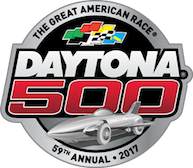
The 2017 Daytona 500, the 59th running of the event, was held on February 26, 2017, and was won by Kurt Busch of Stewart-Haas Racing after Chase Elliott and Kyle Larson ran out of fuel over the final laps of the race. This was Busch's first Daytona 500 win, and his first career win on a restrictor plate track. Ryan Blaney finished second, and A. J. Allmendinger finished third. This race was contested for 200 laps on the 2.5-mile (4.0 km) asphalt superspeedway. It was the first race of the 2017 Monster Energy NASCAR Cup Series season, and also marked the first race for Monster Energy as the new title sponsor for NASCAR's top series, replacing Sprint. Jeffrey Earnhardt made NASCAR history when he became the first ever fourth generation driver to compete in the Daytona 500.
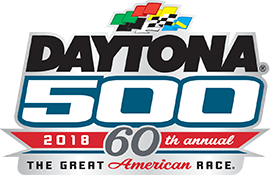
The 2018 Daytona 500, the 60th running of the event, was a Monster Energy NASCAR Cup Series race held on February 18, 2018, contested over 207 laps—extended from 200 laps due to an overtime finish—on the 2.5-mile (4.0 km) asphalt superspeedway. It was the first race of the 2018 Monster Energy NASCAR Cup Series season, and also marked the first race for the Chevrolet Camaro ZL1 as Chevrolet's car for this season, replacing the SS. Austin Dillon of Richard Childress Racing won the race after contact with Aric Almirola on the final lap resulted in a single-car accident for the latter. Bubba Wallace making his first Daytona 500 start finished second while Denny Hamlin came in third. This was the last Daytona 500 starts for Danica Patrick, Trevor Bayne, Kasey Kahne, David Gilliland, Mark Thompson, BK Racing, Furniture Row Racing and D. J. Kennington.
Before the existence of ESPN, live coverage of NASCAR Winston Cup races on television was limited. CBS covered the Daytona 500, the June race at Michigan and the July race at Talladega. ABC usually did the Atlanta race in the spring.
As time passed, more Winston Cup races ended up on TV. ESPN broadcast its first race in 1981, from North Carolina Motor Speedway, and TNN followed in 1991. All Cup races were nationally televised by 1985; networks struck individual deals with track owners, and multiple channels carried racing action. Many races were shown taped and edited on Wide World of Sports and syndication services like Mizlou and SETN, but almost all races were live by 1989. By 2000, the last year of this arrangement, six networks televised at least one Cup series race: CBS, ABC, ESPN, TNN, TBS, and NBC.
Until 2001, race tracks struck individual agreements with networks to broadcast races, but NASCAR wanted to capitalize on the growing popularity of the sport and announced in 1999 that television contracts would now be centralized; that is, instead of making agreements with individual tracks, networks would now negotiate directly with NASCAR for the rights to air a package of races.
References
- ↑ "CBS Sports - Daytona 500". Mark Wood Music. Archived from the original on 2011-07-14.
- ↑ "Nelson/Wolf Sample Reel". Manchester Music Library. Archived from the original on 2016-03-16. Retrieved 2014-10-27.
- ↑ NASCAR on CBS Theme (Extended Version) on YouTube
- ↑ CBS Sports Nascar Closing Music From the Early 1980s on YouTube
- ↑ "Google Search - NASCAR on CBS". Google.
- ↑ CBS's Goodbye To The Daytona 500 - 2000 Daytona 500 on YouTube
- ↑ "Retro Racing: Maumann Shootout". NASCAR. February 5, 2009.
The race was broadcast live on CBS, a precursor to the 500 one week later -- and most NASCAR fans remember how that one turned out.
- ↑ "Berggren joined the CBS Sports racing announce team for the Michigan 400 at Michigan Speedway in 1994". Archived from the original on December 16, 2000. Retrieved September 14, 2017.
- ↑ "April 2 - Texas - CBS; 6.0 rating; 6,053,000 viewers; 3rd highest rated sports show on the broadcast networks". Archived from the original on September 18, 2000. Retrieved 2017-09-14.
{{cite web}}: CS1 maint: bot: original URL status unknown (link) - ↑ "CBS will return in July for the nighttime running of the Pepsi 400, the last of its four Winston Cup races this year in all" . Retrieved 2017-09-14.[ dead link ]
- ↑ 2000 NASCAR Winston Cup Series Pepsi 400 on YouTube
- ↑ 2000 NASCAR Craftsman Truck Series Chevy Silverado 200 on YouTube
- ↑ "NASCAR Countdown: Chicagoland". ESPN MediaZone. July 7, 2007. Archived from the original on May 17, 2008.
- ↑ http://the506.com/yabb/YaBB.pl?num=1232064927/0%5B%5D
- 1 2 3 Wilhelm, Chase (February 13, 2017). "List of Daytona 500 announcers since 1979". Fox Sports.
- ↑ "TV Racing's Mantra: 'Show Me the Money!'". Car & Driver . May 2002.
- ↑ Archive index at the Wayback Machine Quote: "Then in 1983, we introduced the in-car camera. We put the average race fan in the driver's seat. They got a sense for speed, a sense of how close the traffic was. Until 1983, cars didn't look that fast on a 19-inch television screen. All of a sudden you're behind the wheel and you learned these cars drive like a sailboat going 200 mph. You got a sense of what it's like to be a driver. It was reality and fantasy television all in one."
- ↑ Fay, John (February 12, 1999). "Sports on TV-Radio: CBS to let wheels do the talking". The Cincinnati Enquirer . E. W. Scripps Company.
Bob Fishman plans to give viewers a few laps of pure, roaring speed. "We have some great low-angle shots," Fishman said. "It brings those cars right in your face. You see the cars roaring by. I plan to show some laps with nothing but speed shots."
- ↑ "The 1990 Daytona 500". NASCAR.com. July 28, 2003. Archived from the original on August 17, 2007.
- ↑ "CBS to let wheels do the talking". The Cincinnati Enquirer. E. W. Scripps Company. February 12, 2012.
- ↑ "MotorsportsTV.com - TNN". Archived from the original on September 18, 2000. Retrieved 2017-09-14.
{{cite web}}: CS1 maint: bot: original URL status unknown (link) - ↑ "Pocono Qualifying on TV - But Not Live". Archived from the original on August 16, 2000. Retrieved 2007-06-10.
{{cite web}}: CS1 maint: bot: original URL status unknown (link) - ↑ McLeroy, Rea (April 4, 2000). "TV Conflict Left Busch Race Out in Rain". Richmond Times-Dispatch (City ed.). p. E-4.
- ↑ "2001 TV Deal". Archived from the original on September 18, 2000. Retrieved 2017-09-14.
{{cite web}}: CS1 maint: bot: original URL status unknown (link) Quote: In 2000, the last year of the old TV contracts, the total annual TV revenue for Winston Cup races was $100 million. One example of the money under the old system is Las Vegas, where the track had a 5-year deal with ABC for $7 million a year. - ↑ "2001 TV Deal". Archived from the original on September 18, 2000. Retrieved 2017-09-14.
{{cite web}}: CS1 maint: bot: original URL status unknown (link) Quote: In 2000, the last year of the old TV contracts, the total annual TV revenue for Winston Cup races was $100 million. One example of the money under the old system is Las Vegas, where the track had a 5-year deal with ABC for $7 million a year. - ↑ "2001 TV Deal". Archived from the original on September 18, 2000. Retrieved 2017-09-14.
{{cite web}}: CS1 maint: bot: original URL status unknown (link) Quote: While many fans were upset that ESPN and CBS lost the rights, insiders say that their bids were close to $100 million annually under the winning bids from Fox and NBC. - ↑ NASCAR wanted more races on network TV - Ernest Hooper, St. Petersburg Times, 18 February 2000
- ↑ Weaver, Matt (June 12, 2021). "CBS Says SRX Isn't a Testing Ground for IndyCar, NASCAR Pursuit". Autoweek.
- ↑ "TV Ratings - 2000 Season". Archived from the original on February 6, 2001. Retrieved 2017-09-14.
{{cite web}}: CS1 maint: bot: original URL status unknown (link) - ↑ "TrackCast Rating". Archived from the original on August 16, 2000. Retrieved 2017-09-14.
{{cite web}}: CS1 maint: bot: original URL status unknown (link) - ↑ "Accounting profit on NASCAR only tells part of the story. Demographics and network prestige are just as important". Archived from the original on August 16, 2000. Retrieved 2007-06-10.
{{cite web}}: CS1 maint: bot: original URL status unknown (link) Quote: Remember what happened to CBS after they lost the NFL and look at the positive that has happened there since they regained the NFL. The Olympics don't make money for the networks directly either. But they're still worth the big bucks for other reasons. - ↑ "BUDDY BAKER (CBS Sports Analyst)". Archived from the original on March 29, 2001. Retrieved 2017-09-14.
{{cite web}}: CS1 maint: bot: original URL status unknown (link) - ↑ "DICK BERGGREN (CBS Sports Reporter)". Archived from the original on December 16, 2000. Retrieved 2017-09-14.
{{cite web}}: CS1 maint: bot: original URL status unknown (link) - ↑ "Eli Gold". RacingSpeakers.com. Archived from the original on 2007-06-08.
Eli Gold has also worked in a play-by-play role with both CBS Sports and NBC Sports in their coverage of NASCAR racing.
- ↑ Fay, John (February 12, 1999). "Sports on TV-Radio: CBS to let wheels do the talking". The Cincinnati Enquirer. E. W. Scripps Company.
CBS has added its biggest sports name, Greg Gumbel, as co-host with Ken Squier. Gumbel is a mainstream name, who could help bring some non-racing fans to the broadcast. What he doesn't bring is any racing expertise. "I don't know a fender from a spoiler," he said. That's an exaggeration. Gumbel did local sports for 71/2 years and SportsCenter on ESPN for 51/2 years, so he's familiar with racing. He won't try to fool NASCAR fans. "I am not an expert," he said. "But I'm working with a bunch of them."
- ↑ "NED JARRETT (CBS Sports Analyst)". Archived from the original on March 21, 2001. Retrieved 2017-09-14.
{{cite web}}: CS1 maint: bot: original URL status unknown (link) - ↑ "MIKE JOY (CBS Sports Play-by-Play)". Archived from the original on March 21, 2001. Retrieved 2017-09-14.
{{cite web}}: CS1 maint: bot: original URL status unknown (link) - ↑ Lauer, Cheryl (February 16, 2007). "Behind the Microphone with Mike Joy, NASCAR on Fox". SpeedCouch.
During the 1984 Daytona 500, Mike began working as a pit reporter for CBS. Since CBS only broadcast a few races, he was able to continue working the MRN broadcasts through 1985. During this time, he also continued do public address work at Stafford and actually worked as the promoter at Lime Rock Park, also in Connecticut. Unfortunately, as Mike was really getting into that job and making big plans for the next season, CBS greatly increased his network workload, so he reluctantly had to give up the Lime Rock job. Mike worked for TNN from 1991 to 1995. After that he became primary anchor in the CBS booth for Daytona 500 coverage beginning in 1998 and through 2000, the last year on their NASCAR contract.
- ↑ "RALPH SHEHEEN (CBS Sports Reporter)". Archived from the original on March 21, 2001. Retrieved 2017-09-14.
{{cite web}}: CS1 maint: bot: original URL status unknown (link) - ↑ "BILL STEPHENS (CBS Sports Reporter)". Archived from the original on February 9, 2001. Retrieved 2017-09-14.
{{cite web}}: CS1 maint: bot: original URL status unknown (link) - ↑ "KEN SQUIER (CBS Host)". Archived from the original on March 21, 2001. Retrieved 2017-09-14.
{{cite web}}: CS1 maint: bot: original URL status unknown (link)